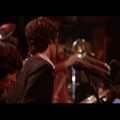Cseh-Bereményi: Dal a ravaszdi Shakespeare Williamről.
A genius that transcends space and time, William Shakespeare is practically considered to be a national treasure in Hungary. Hamlet was first staged in 1794 in Kolozsvár, which marks almost 200 years after the original production, but in fact it was among the early appearences of the author's work on the continent. A boom in translations and productions soon followed. Similarly to Goethe and Schiller being fascinated by Shakespeare on German soil, his plays were tanslated by the most revered Hungarian poets, including Vörösmarty, Arany, Kosztolányi and Lőrinc Szabó.
The admiration of the audience mirrored that of the literary circles and to this day, theatre-goers as well as academics continue to be devoted to exploring Shakespeare's universe. Its reception is an enduring vehicle of reviving human mysteries, advancing liberal arts and presenting Western models to a society that is ever hesitant to fully adopt them.
The chanson translated here is an illustration of how Shakespeare penetrated the imagination of the most prominent urban folk singer of Budapest in the 1970s and 80s. Tamás Cseh sings the words of his lifelong collaborator Géza Bereményi, expressing an unabashed, yet playful appreciation of the Bard. The dense lyrics, evoking and commenting on three of the four greatest tragedies written by 'William the Sly' (only Macbeth is omitted here) are Shakespeare-esque in their own right. Brimming with allusions and wordplay, the song pays a hugely enjoyable hommage to the author in more ways than one.
A Song About William The Sly
Once upon a time in distant Denmark
There lived a crown prince who made a choice
To act as a madman and thus hide his secret
You may call it cowardice, you may call it poise
The prince was unharmed by the madness of power
But not so by the edge of a poisoned sword
His throne was taken by orderly nobles
Playing their games 'twixt peace and war
And yet the life and death of this brilliant child
Was commemorated far and wide
And his tombstone shines to this day and age
You can admire it on the theatre stage
Show me a man, be far or nigh
Who can hold a candle to William the Sly
Show me a man, be far or nigh
Who can hold a candle to William the Sly
On one dark night a Moorish lord
Laid his hands on the neck of his wife
And as the fair one thereby suffocated
No blood was shed in this marital strife
The ways of the heart that ever meander
Open to a new view in scene after scene
Shaken and trembling we peek over the corner
In a maze built from mirrors, the great could-have-been
And here we stand as the Moorish lord
Casting away the one we should hold
And here we stand with gaping eyes
Amazed by the craft of William the Sly
Show me a man, be far or nigh
Who can hold a candle to William the Sly
Show me a man, be far or nigh
Who can hold a candle to William the Sly
A hunch on the back that's hard to believe
Can still be made believable
The way to achieve it is bending the world
To mirror the shape of a human cripple
The distorted world is a fit for our hero
As he embraces the crutch of the times
A man that is bent in days that are bent
Is a gentleman fine that dazzles and shines
With an itch in the back, we gaze on the man
Who shapes up to the world as only he can
As Richard the Third, before the great fall
Shined on the stage and dazzled us all
Show me a man, be far or nigh
Who can hold a candle to William the Sly
Show me a man, be far or nigh
Who can hold a candle to William the Sly
Our mirror is shattered, the shards are laid bare
But Mr. Shakespeare comes to the repair
And there we stand with gaping eyes
Amazed by the craft of William the Sly
Show me a man, be far or nigh
Who can hold a candle to William the Sly
Show me a man, be far or nigh
Who can hold a candle to William the Sly
Show me a man, be far or nigh
Who can hold a candle to William the Sly






